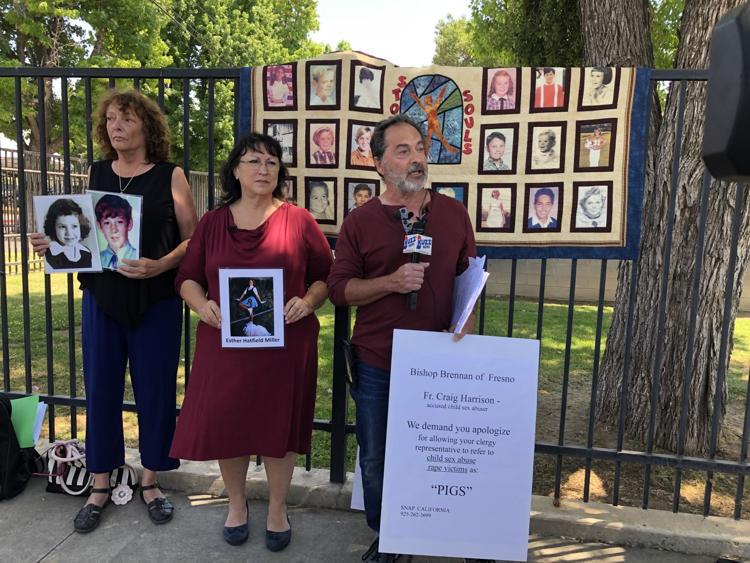|
SNAP, with its fiery brand of victim advocacy and support, has critics and controversy
By Stacey Shepard
Three members of a nationwide group that advocate for victims of clergy sex abuse stood on a shady patch of a sidewalk Tuesday in front of the Roman Catholic Diocese of Fresno. In front of TV cameras and reporters, they said five people have called or emailed them in the past week claiming sex abuse by Monsignor Craig Harrison, a well-known and highly regarded Bakersfield priest. They castigated the bishop for his handling of the situation and passed out a list of nearly two dozen clergy the group claimed had been accused of sex abuse and had some past or present affiliation with the diocese. This was, for many, an introduction to the Survivors Network of those Abused by Priests, or SNAP, as the group is known. While the group has been around 30 years and has nine chapters in California, none exist between Los Angeles and Sacramento. The group's sudden arrival on the scene in the wake of allegations against Harrison has come with the organization's trademark brand of in-your-face, watchdog activism.
SUPPORT AND CONFRONTATION
According to its website, the organization is considered a loose network of volunteers who provide peer support to victims of clergy and other institutional abuse, share their stories and empower others to "confront the truth." The site says the group also engages in advocacy for laws to protect children from abuse, and "exposes predators." SNAP got its start in 1989 by founder Barbara Blaine, who had recently gone public with her story of abuse as a teen by a priest in Toledo, Ohio. She put an ad in the National Catholic Reporter looking for other victims of clergy sex abuse to start a support group, according to her obituary in The New York Times. Today, the organization is a nonprofit with chapters throughout the country and around the world. "We’re not an anti-Catholic organization. We’re not anti-priest. All we are is anti-child molester," said Joey Piscitelli, a SNAP volunteer leader in Northern California who was at the diocese in Fresno last week. Piscitelli won a civil lawsuit in 2006 against a priest in the Bay Area for repeatedly raping him as a teenager.
HURT AND ANGRY
Steve Pehanich, senior director of advocacy and education for the California Catholic Conference of Bishops, said the church has no relationship with the organization and declined to weigh in on the merits of the group. "They’re people that have been abused by priests or allege they’ve been. They're hurting," he said, acknowledging widespread clergy sex abuse in the past. The church has take many steps to address the issue since 2002, he said. That was the year the U.S. Conference of Catholic Bishops held a meeting in Dallas and adopted the “Charter for the Protection of Children and Young People." In it, bishops pledged to establish procedures for handling sex abuse allegations and to be open and transparent with the process. The charter included a "zero tolerance" policy for sexual abuse and reforms were instituted requiring background checks for church employees and reporting of alleged abuse to law enforcement. Coincidentally, former SNAP national leader David Clohessy, a victim of church sex abuse, was one of the victims who addressed the conference. "If it wasn't for SNAP and former leaders Clohessy and Blaine, I don't think Boston or Pennsylvania would have happened," said Joseph George, a Sacramento attorney who represents sex abuse victims, referring to two bombshell cases of widespread clergy sex abuse. "Courageous victims who were abused spoke up publicly. How much courage did that take?" To some, SNAP tactics may seem aggressive or heavy-handed. The group regularly publishes lists of clergy accused of abuse and was known in the past for showing up at an accused priest's church and placing notices on the windshields of parishioners' cars. It regularly accuses the church of cover-ups and failing victims. Teresa Dominguez empathizes with the simmering emotion. "Victims of abuse are each very unique,” said Dominguez, communications director for the Fresno Diocese, when asked about SNAP. “They articulate their pain differently and are in different places on the path to healing. Anger is among the many emotions that they experience.”
‘WAR’ AND WHISTLEBLOWERS
But the group is not without its detractors and controversy. In a 2011 report published on its website, the Catholic League for Religious and Civil Rights, an anti-defamation and civil rights organization, and longtime critic of the group, said SNAP was waging war on the Catholic Church. It criticized the group for manipulating the media and capitalizing off abuse victims. SNAP made headlines again in 2017 when a former fundraiser claimed in a whistleblower lawsuit against the organization that SNAP was colluding with attorneys who represent sex abuse victims. A St. Louis Post-Dispatch news story quoted the lawsuit as stating: “SNAP does not focus on protecting or helping survivors — it exploits them. SNAP routinely accepts financial kickbacks from attorneys in the form of ‘donations.’ In exchange for the kickbacks, SNAP refers survivors as potential clients to attorneys, who then file lawsuits on behalf of the survivors against the Catholic Church.” SNAP officials denied the accusations, according to the newspaper's report. "They're doing what they think they need to do," to help victims of clergy abuse and prevent it, said Pehanich, of the California Catholic Conference of Bishops. "And the church is doing as much as it can." Contact: sshepard@bakersfield.com
|
.
Any original material on these pages is copyright © BishopAccountability.org 2004. Reproduce freely with attribution.
